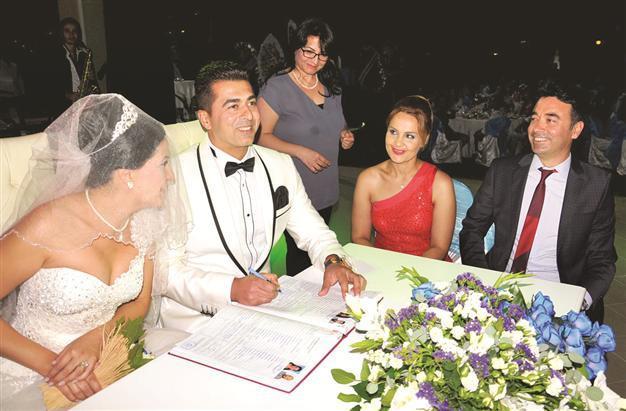Top court ruling on religious marriages sparks debate in Turkey
ANKARA

DHA Photo
Turkey’s Constitutional Court has legalized the right to be religiously married without obtaining a civil marriage, sparking debate over the decision’s impact on women and children.
The ruling has drawn stern criticism from all sides, including lawyers, ruling party representatives, and opposition deputies.
Family and Social Policies Minister Ayşenur İslam said the government would not allow a legal environment that could lead to unofficial marriages of children, adding that new regulations were needed to prevent illegal marriages of minors.
Also expressing her suspicions, Deputy Parliament Speaker Ayşenur Bahçekapılı said the ruling would lead to unjust practices against women and children. Bahçekapılı, from the ruling Justice and Development Party (AKP), also drew attention to a possible rearrangement of legal infrastructure according to the ruling and added that such a rearrangement would be wrong.
Main opposition Republican People’s Party (CHP) deputy Candan Yüceer said the ruling would increase the number of child marriages, with women and children losing all of their legal rights.
The ruling comes a year after the Erzurum Criminal Court of Peace appealed the case of three defendants, two religiously wed without civil marriage and one imam who ordained the wedding, to the Constitutional Court to overturn paragraph 5 and 6 of item 230 in the Turkish Criminal Code (TCK), which required the three to serve at least two months in prison.
The Constitutional Court annulled the paragraphs with a majority of 12 against four and revoked the indictment that carried the penalty of at least two months in prison.
Court members against the ruling said such an amendment could prioritize religious weddings over civil marriage and even become an alternative for the latter, adding that it would cause legal and economic problems for women and children. Some also said the decision would damage the country’s secular foundation and be against reform laws enacted at the time of Turkey’s foundation.
In 1999, the Bursa Criminal Court of First Instance appealed to the AYM to overturn the same two paragraphs of the TCK. The Constitutional Court, however, said the application was invalid, stating a couple living together was not a crime according to the TCK, but living together under solely a religious union was. The Court at the time said such a partnership violated gender equality and the principle of justice.
“The Turkish Civil Code, introduced in 1926, aims to strengthen women’s position in society with civil marriage, as well as secure a high quality of life for mothers and their children. It goes without saying the punishment for a religious wedding done without civil marriage is for the public good and order when the impacts of marriages based on religious principles on women and children are considered. The Turkish state is responsible to protect mothers and their children according to item 41 of the Turkish constitution ... The secular laws of the constitution should not be perceived to be against religion, as there is no restriction on religious marriages and people are free to religiously wed as long as they secure a civil partnership with legal marriage as defined in the Turkish Civil Code,” the Constitutional Court stated in 1999, when Ahmet Necdet Sezer, Turkey’s 10th president, presided over it.
